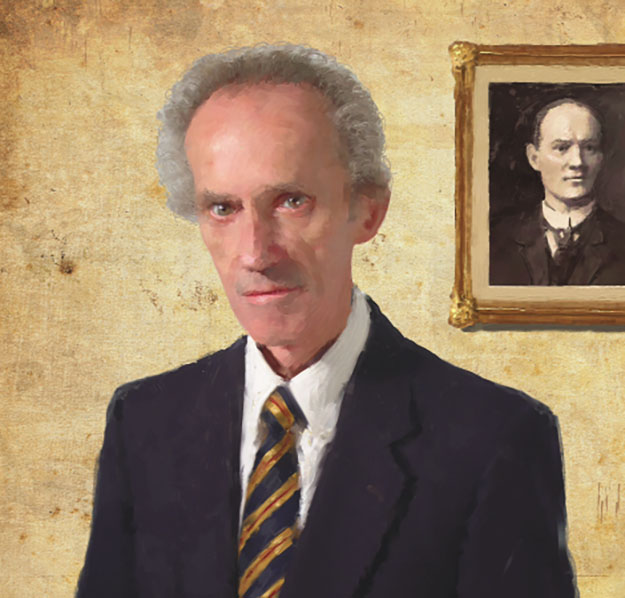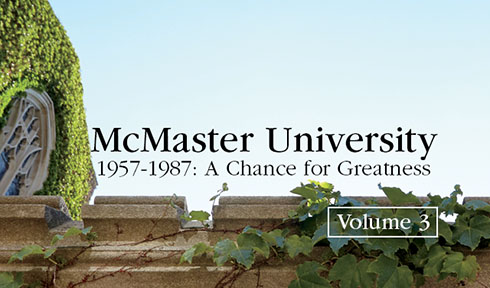‘A Chance For Greatness’ offers an in-depth look at modern McMaster history

Author, historian and three-time McMaster alumnus James Greenlee, as depicted by artist Michael Coyne. Greenlee, a professor emeritus at Memorial University, penned 'McMaster University 1957-1987: A Chance For Greatness.' The third official volume of McMaster history will be released April 23.
It was the middle of the roaring-hot summer of 2007 when Peter George first approached James Greenlee with a gleam in his eye.
Greenlee, a professor emeritus at Memorial University and three-time McMaster alumnus, was enjoying an extended stay in Hamilton to play baseball with a group of friends from the University.
George, in the midst of his final term as McMaster’s president and vice-chancellor, was searching for an author and historian capable of tackling the next official volume of McMaster history.
His list had been narrowed down to one man, and that man wasn’t interested. Not at first, anyway.
“At that moment, I had just signed on with two colleagues in the United States to write a book about the Great War,” Greenlee tells me over the phone from his home in Corner Brook, Newfoundland.
“I suggested a few other authors, but Peter wasn’t having it. He kept asking for more than a year-and-a-half until I finally said yes, and I’m glad I did.”
What Greenlee said “yes” to would eventually become McMaster University 1957-1987: A Chance For Greatness. The third official volume of McMaster history will be released during an April 23 Founder’s Day ceremony in Alumni Memorial Hall.
Purchase the book online at the Campus Store
The book focuses on a crucial transition period in University history — a three-decade span that included the end of Baptist influence on campus, an unprecedented explosion in student population, the founding of the University’s medical school and the construction of major campus resources such as the McMaster Nuclear Reactor, among other milestones.
A Chance For Greatness also covers the groundbreaking institutional shift from offering traditional liberal arts and applied science programs toward supporting increased academic specialization and funding world-class graduate and doctoral research across a number of disciplines — particularly those involving science, medicine and engineering.
Harry Thode, president and vice-chancellor of the University from 1961-1972, is a key figure in the book’s central narrative of change and innovation.
“Harry is the father of the modern university as we know it,” says Karen McQuigge, director of Alumni Advancement and one of the project leads on the book’s advisory committee. “In many ways, we’re the institution we are today because of his vision.”
“By the time he retired in 1972, he had accomplished just about everything he wanted to,” continues Greenlee, who writes in A Chance For Greatness that Thode was “committed to catapulting McMaster into the front rank of Canadian universities.”
One of his crowning achievements was entrusting a 35-year-old Rhodes Scholar named Dr. John Evans with founding the University’s medical school in 1965.
Evans, who passed away in February, helped elevate the University’s global reputation through the innovative “McMaster Approach,” a radical new system that encouraged small-group and problem-based learning, earlier exposure to patients and increased collaboration with community partners.
The McMaster Approach — developed by Evans and four like-minded colleagues at the University, Dr. William Walsh, Dr. Fraser Mustard, Dr. William Spaulding and Dr. James Anderson — has since been adopted by hundreds of medical education programs around the globe.
“Decades later, in 2010, Evans recalled his first meeting with Thode, as though it were only yesterday,” writes Greenlee. “McMaster’s president, he reminisced, fairly ‘radiated integrity’ and burning enthusiasm, as they discussed the inter-disciplinary model of a science-driven university of which medicine could be a nodal point.”
Researching and writing the 476-page tome was no easy task.
Greenlee and his wife — Heather King, a principal research assistant on the project — relocated from Newfoundland to a rented home on the Hamilton Mountain in the spring of 2009 to begin their work in earnest. Maarten Gerritsen, a former McMaster researcher and current teacher candidate at Brock University, was also brought on board to help.
What followed was more than two years of meticulous combing through dusty banker boxes and yellowing papers in McMaster’s scattered institutional archives.
Greenlee initially focused his efforts on the Presidents’ Papers dating from 1957-1980 — more than 100 boxes of loosely-categorized but crucial material located in the William Ready Division of Archives and Research Collections in Mills Memorial Library.
From here, he read the entire run of Senate minutes collected during the book’s three-decade span, “a task I wouldn’t wish on my worst enemies,” Greenlee jokes. The latter yielded some of the most frank and forthright discussions between campus leaders, including heated debates about McMaster’s short and long-term future.
Greenlee also pored over back issues of The Silhouette, McMaster Courier, Contact, The Hamilton Spectator and other relevant publications, and conducted marathon interviews with influential alumni and University administrators active during the book’s time period.
More often than not, the team’s persistence paid off. Greenlee recalls one fateful afternoon of digging alongside David Wilkinson, then dean of the Faculty of Engineering and McMaster’s current provost.
“David pried open a long-forgotten door near his office, and there was the motherlode,” says Greenlee. “I brushed off the cobwebs and we found a crucial archive full of departmental minutes and other important papers related to the Faculty of Engineering.”
The book concludes in McMaster’s centennial year, 1987 — long before most of the current student body was even born. Regardless, Greenlee believes A Chance For Greatness will resonate with readers young and old. Those eager to learn more about the University’s rapid, exciting and, at times, turbulent mid-century evolution will find it to be an engaging read chock-full of “turning points and crisis moments,” he offers.
“I believe the book captures the spirit and ethos of McMaster during this time period,” says Greenlee. “It’s not a yearbook, but I’m hopeful it will offer a deeper understanding of the University’s history and illuminate some of the larger issues at play.”
The launch event for A Chance For Greatness will take place Thursday, April 23 in Alumni Memorial Hall from 3 to 4:30 p.m. Light refreshments will be served. Please RSVP by Monday, April 20 to macrsvp@mcmaster.ca or 905-525-9140 ext. 27578.
On Friday, April 24, Greenlee will deliver a lecture in Robinson Memorial Theatre from noon to 1 p.m., followed by a book-signing at the Campus Store (Gilmour Hall B101). The lecture will focus on McMaster’s history between 1957-1987, and will include service of a light lunch.
Only 1,000 copies of the book will be printed by McGill-Queen’s University Press during the initial publication run, and members of the campus community are encouraged to act quickly to own a piece of University history.
To celebrate the book’s publication, the first two volumes of McMaster history — written by alumnus and historian Charles Johnston, a friend and mentor of Greenlee’s — will also be reprinted later this year.


